If you’re leaving your home for an extended period, consider closing all propane supply valves. This includes the main gas supply valve on the propane tank as well as gas supply valves located near individual appliances. WHEN YOU RETURN to your home after an extended absence, contact your propane retailer or a qualified service technician to conduct a leak check before the propane is turned on and to re-light the pilot lights.
IF YOU LIGHT A PILOT LIGHT YOURSELF, YOU ARE TAKING THE RISK OF STARTING A FIRE OR AN EXPLOSION. MANY SERIOUS INJURIES OCCUR WHEN PEOPLE ATTEMPT TO LIGHT PILOT LIGHTS. PROCEED WITH GREAT CAUTION AND FOLLOW THESE RULES:
- Carefully follow all of the manufacturer’s instructions and warnings concerning the appliance.
- If the appliance is in a basement or closed room, thoroughly ventilate the area before lighting the pilot.
- DO NOT smoke or have any source of ignition (such as flames or spark-producing materials) in the area before lighting the pilot.
- Be especially alert for the smell of propane. Sniff at floor level before lighting a pilot.
- IF YOU SMELL GAS, DO NOT LIGHT THE PILOT LIGHT.
- DO NOT allow any extra or unnecessary people (especially children) to remain in the room or area of the building where you are lighting a pilot.
- DO NOT try to light pilot lights in any area where other odors may make it difficult for you to detect the smell of a propane leak.
- DO NOT light the pilot if a musty or damp smell persists. These conditions can mask the smell of propane.
- DO NOT apply force or use tools on the pilot light or its control. This could cause damage that leads to gas leakage. Use only your hands to operate knobs, switches, or buttons.
- DO NOT attempt to let air out of gas lines by opening a valve or fitting inside a building or enclosed space. You may release gas and not be able to smell it.
- DO NOT apply oil to a sticky knob or button on a gas control valve. Oil can cause the control valve mechanism to stick and malfunction.
Click the links below to see more about each specific topic.
Space Heater Safety
- USE THE RIGHT KIND OF HEATER. Some propane space heaters are designed only for use outdoors. Others are designed only for use indoors. Check your owner’s manual or contact a qualified service technician to be sure you are using the right kind of heater.
- DO NOT USE AN OUTDOOR HEATER INDOORS. High levels of CO can be generated from heaters that are not designed for indoor use. High levels of CO can make you dizzy, give you headaches, or cause flu-like symptoms. In extreme cases, extended exposure to CO can result in brain damage or death.
- READ YOUR SPACE HEATER MANUAL. The appliance manufacturer’s manual that came with your space heater tells how to set up and operate it safely. Read the entire manual and carefully follow all directions.
Appliance Maintenance
- MAINTENANCE IS IMPORTANT. All appliances using propane must be properly maintained in order to operate safely, properly, and efficiently.
- LEAVE IT TO THE EXPERTS. Only a qualified service technician has the proper training to install, service, maintain, and repair your appliances. Make sure you have a qualified service technician install and service your appliances.
- ANNUAL INSPECTION IS IMPORTANT. Contact a qualified service technician to perform an appliance inspection.
- BE SURE YOUR APPLIANCES CAN “BREATHE” PROPERLY. Regularly check the vents of your appliances to be sure that flue gases can flow easily to the outdoors. Insects, birds, and small animals sometimes build nests in vent pipes. Other obstructions such as snow or ice may also occur. If you see evidence of this, call a qualified service technician. Also, clear the area around your appliance to be sure plenty of air can reach the burner for proper combustion. Note: Not all propane appliances require venting.
- NEVER store combustible materials near appliances.
- WATCH FOR YELLOW FLAMES OR SOOT BUILD-UP. When appliances are operating properly, propane burns with a blue flame. If you see yellow flames, or notice significant amounts of soot on any equipment, the gas may not be burning completely. This can create carbon monoxide, a colorless, odorless, and poisonous gas. Contact a qualified service technician if any of the above conditions occur.
If you move or get a new appliance:
- TREAT CONNECTORS WITH CARE. When an appliance is moved, be careful not to damage the appliance connector (the flexible tubing that brings gas to the unit). Older connectors can crack if flexed or twisted, which can lead to a gas leak.
- IS THE APPLIANCE DESIGNED TO USE PROPANE? Be sure that any new or used appliance being installed is designed for use with propane. Natural gas appliances SHOULD NOT be used with propane unless a qualified service technician has made required adjustments to the appliance.
- HAVE THE APPLIANCE CHECKED OUT BEFORE YOU USE IT. Be sure that the appliance is properly installed and that all controls and valves operate correctly. Contact a qualified service technician for assistance.
- CAP OR PLUG UNATTACHED GAS LINES. If you move a gas appliance and disconnect it from a gas line, be sure to contact your propane retailer or a qualified service technician to close, cap, or plug the open gas line. Any connectors or gas line not connected to an appliance can leak gas, or can be damaged if water accumulates inside it. The valve on any unattached gas line must be closed, and the open end must be sealed by installing a threaded cap or plug.
Tampering with Appliances or Propane
- DO NOT UNDER ANY CIRCUMSTANCES try to modify or repair valves, regulators, connectors, controls, or other appliance and cylinder/tank parts. Doing so creates the risk of a gas leak.
- CALL AN EXPERT. If you are unable to operate any part of your propane system, or if you think an appliance or other device is not operating properly, call your propane retailer or a qualified service technician. They can inspect, adjust, repair, or replace any part of your propane system.
- YOUR PROPANE SYSTEM IS DESIGNED FOR SAFETY. Propane cylinders, tanks, and appliances incorporate special components (such as valves, connectors, controls, burners, and pilot lights) to keep them safe for use. Damaging these components can cause gas leaks.
FLAMMABLE VAPORS ARE A SERIOUS SAFETY HAZARD!
Vapors from flammable products such as gasoline, kerosene, paint thinner, and solvents, can be ignited accidentally by the pilot light of a propane appliance. Flammable vapors are often heavier than air and may travel along the ground and collect in low or confined areas (such as a basement or pit). Sometimes the vapors may follow air currents in the building to higher levels. Any source of ignition in these areas (such as a pilot light, spark, heater element, or electric motor) could cause an explosion or a fire.
TO HELP REDUCE THE RISK OF FLAMMABLE VAPOR IGNITION:
- Store flammable liquids in well-sealed containers outside.
- Do not use gasoline, cleaning fluids, oil-soaked rags, or other flammable liquids inside a building where propane appliances are located.
- PROPANE VAPORS CAN BE DANGEROUS. Propane vapor is also combustible and can ignite explosively. Keep propane storage containers closed. Never store propane cylinders in an enclosed area, or near a heat or ignition source.
Call 811 Before You Dig
A federally-mandated national number “Call Before You Dig” (811), was created to help protect you from unintentionally hitting underground utility lines while working on digging projects. People often make risky assumptions about whether or not they should get their utility lines marked before digging due to concerns about project delays, costs and previous calls about other projects. If you hit an underground utility line while digging, you can harm yourself or those around you, disrupt service to an entire neighborhood and potentially be responsible for fines and repair costs. These assumptions can be life-threatening.
Are you planning on building a deck? Planting a tree? Installing a mailbox? If so, call 811 before you dig and you will be connected to your local call center. Whether you are a homeowner or a professional excavator, your underground utility lines will be marked for FREE when you call 811!
Be sure to check with your State rules and regulations governing digging prior to any excavation.

